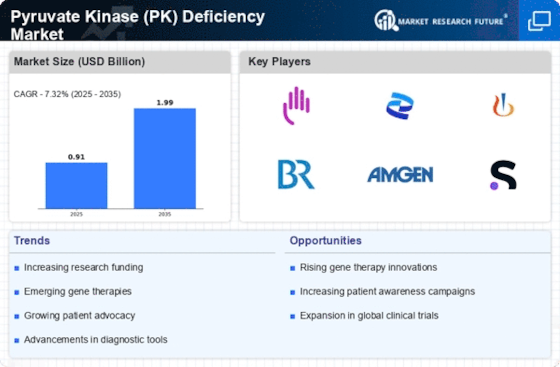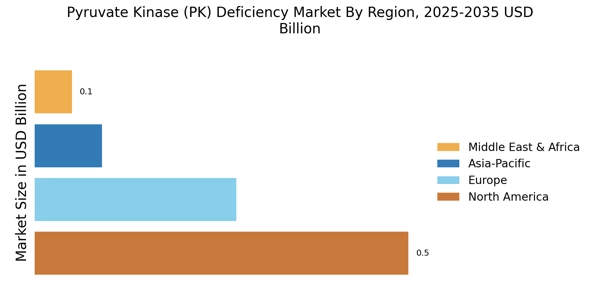Emerging Therapeutic Options
The development of new therapeutic options is a critical driver in the Pyruvate Kinase (PK) Deficiency Market. Recent research has led to the exploration of novel treatments, including enzyme replacement therapies and gene therapies, which hold promise for improving patient outcomes. Clinical trials are underway to evaluate the efficacy and safety of these emerging therapies, potentially transforming the treatment landscape for PK deficiency. As these innovative solutions progress through the development pipeline, they are likely to attract significant investment and interest from pharmaceutical companies. The introduction of effective therapies could lead to a substantial increase in market size, as patients and healthcare providers seek out the latest advancements in treatment. This dynamic environment suggests a robust future for the Pyruvate Kinase (PK) Deficiency Market.
Advancements in Genetic Testing
Recent advancements in genetic testing technologies are significantly influencing the Pyruvate Kinase (PK) Deficiency Market. Enhanced diagnostic capabilities allow for earlier and more accurate identification of PK deficiency, which is crucial for effective management. The introduction of next-generation sequencing and other molecular diagnostic tools has streamlined the testing process, making it more accessible to patients. As a result, healthcare providers are increasingly able to offer personalized treatment plans based on genetic profiles. This trend not only improves patient outcomes but also drives market growth as more individuals seek testing. The integration of genetic testing into routine clinical practice is expected to bolster the Pyruvate Kinase (PK) Deficiency Market, as it facilitates timely interventions and enhances overall disease management.
Increasing Prevalence of PK Deficiency
The rising incidence of Pyruvate Kinase (PK) deficiency is a notable driver in the Pyruvate Kinase (PK) Deficiency Market. Recent estimates suggest that the condition affects approximately 1 in 20,000 individuals, with variations across different populations. This increasing prevalence is likely to lead to a higher demand for diagnostic and therapeutic options, thereby expanding the market. As awareness grows among healthcare professionals and patients, the identification of undiagnosed cases may further contribute to market growth. The need for effective management strategies and treatments for PK deficiency is becoming more pronounced, indicating a potential surge in market activity. Consequently, stakeholders in the Pyruvate Kinase (PK) Deficiency Market are likely to focus on developing innovative solutions to address this growing patient population.
Growing Patient Advocacy and Support Groups
The rise of patient advocacy and support groups is playing an influential role in the Pyruvate Kinase (PK) Deficiency Market. These organizations are dedicated to raising awareness about PK deficiency, providing resources for patients and families, and advocating for research funding. Their efforts contribute to increased visibility of the condition, which may lead to more individuals seeking diagnosis and treatment. Furthermore, these groups often collaborate with healthcare professionals and researchers to promote education and understanding of PK deficiency. As patient advocacy continues to grow, it is likely to drive demand for healthcare services and products related to PK deficiency, thereby expanding the market. The engagement of these organizations highlights the importance of community support in addressing the challenges faced by individuals with PK deficiency.
Regulatory Support for Rare Disease Treatments
Regulatory support for treatments targeting rare diseases, including Pyruvate Kinase (PK) deficiency, is a significant driver in the Pyruvate Kinase (PK) Deficiency Market. Governments and regulatory bodies are increasingly recognizing the need for expedited approval processes for therapies aimed at rare conditions. Initiatives such as orphan drug designations and fast-track approvals are designed to encourage the development of innovative treatments. This supportive regulatory environment is likely to stimulate investment in research and development, as companies seek to bring new therapies to market more efficiently. As a result, the Pyruvate Kinase (PK) Deficiency Market may experience accelerated growth, with a greater number of treatment options becoming available to patients in the near future.

















